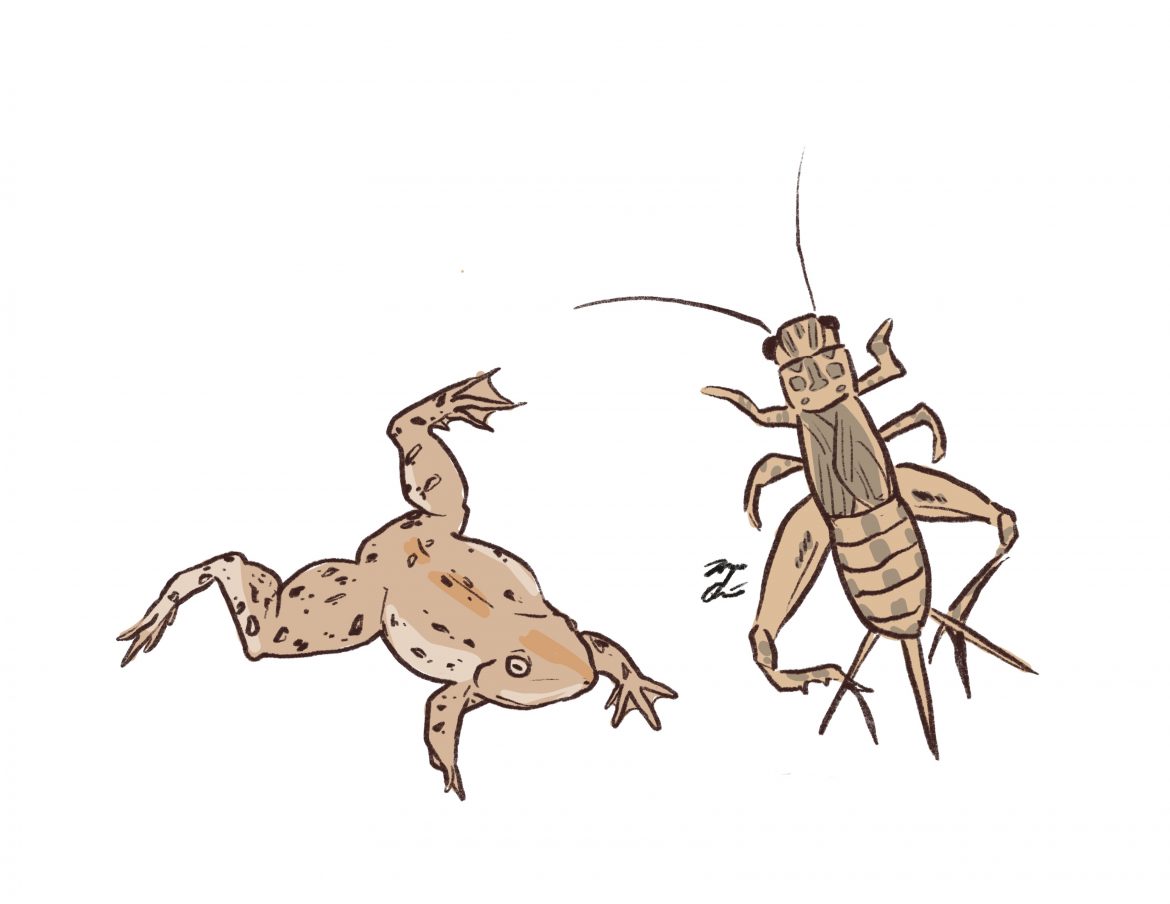Illustration Credit: Joyce Qiu, Illustration Editor
Repairing a relationship with food damaged by shame
Jasmine Wei, Contributor
Being Chinese, bringing my lunches to school would often garner me side-eyes and dog-eating jokes from my non-Chinese peers. That’s how I found out that some of my most beloved childhood meals were considered strange by the average Canadian. My favourites — chicken feet, century eggs, pig blood — became my greatest shame. What hurt even more was seeing my Chinese peers begin dismissing these dishes as well. Food is such an integral part of our culture; being forced to feel ashamed of it was ridiculous, and yet I hung my head low and took the judgment without much of a fight.
Then, while at a restaurant with my family, a particular item on the menu caught my eye: fried mealworms. My knee-jerk reaction was to narrow my eyes in disgust. Mealworms, in all their wriggly, maggot-like glory, were one of the last things I would consider edible. Before I moved on and checked the rest of the menu, a feeling of déjà vu hit me. I just dismissed something I’ve never tried as gross just because it was unfamiliar to me — the same thing my peers did to me in the past. I felt guilty. Guilty for judging something as innocuous as food, as if the world wasn’t judgmental enough. I swallowed my pride and told myself that if it was widespread enough to be served at a restaurant, it probably had some merit. Why would they serve something that no one wants to eat? When the waiter came to take our orders, the fried mealworms were the first thing I chose.
They tasted fine. I don’t quite remember exactly how — it’s been a long time since that happened. But they weren’t gross like I thought they would be. Just fine. Even then, this one bowl of mealworms opened a whole universe of possibilities to me. What other foods have I been missing out on? Societal restrictions on what we could and could not eat soon felt arbitrary to me. Why are different foods considered weird in different parts of the world when essentially, they are just food? Why do we always feel the need to mock and shun anything that is different from what we are used to? Why should people be ashamed of what they enjoy? The more I thought about it, the less I understood. In the end, what was considered acceptable and unacceptable to eat boiled down to social constructs.
I started by trying out more accessible options like escargot, which soon became a favourite of mine. They have a chewy texture that pairs perfectly with the butter they’re served with. Frog packed a punch that chicken never did for me. Sea cucumber brings a unique flavour that I can’t find anywhere else. Suddenly, food became a lot more enjoyable than it already was due to the added variety. Every time I had doubts about an uncommon dish, I would repeat to myself again, “Why would they serve something that no one wants to eat?”
Because of this, I ended up being people’s worst nightmare. I would often get curious if something was edible or not and start researching dishes. Then, I wouldn’t shut up until it came in contact with my taste buds (I’m still trying to get my hands on some tarantula). People know me as someone with a strange appetite, but I dislike this label. I think it’s a good thing to be more open-minded to culturally integral things like food. I want open-mindedness towards food to be encouraged more, hence why I am writing this article. So, if anyone is looking to expand their horizons as well, I have some advice:
1. Especially uncommon foods pose a greater risk of food poisoning than others since few people know how to prepare them properly. Stick to eating or taking preparation instructions from reputable chefs. Food poisoning is not fun!
2. Try to source foreign food from stores and restaurants that specialize in that culture — the point of eating adventurously is to appreciate the variety of what people prepare around the world.
3. Consider the moral implications of dishes before deciding to eat them. What are you affecting if you eat this dish? Is it prepared in an ethical way?
4. Try not to be discouraged if something is unsavoury. There are millions of amazing dishes out there, so don’t give up if a couple of them are not to your taste.
Most people don’t take me seriously when I speak about my eating habits, since they don’t sound very appealing at first. But if you have taken the time to hear me out and consider the merits of eating outside of what you are used to, then I appreciate your enthusiasm! I hope that in the future we can be more accepting of others through our shared appreciation for food.




